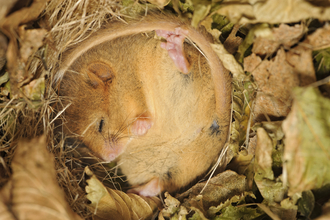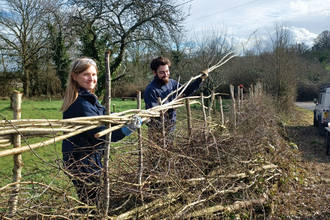Nature Reserves Fund
Protect Dorset's vital habitats
Your donation to the Nature Reserves Fund is a lifeline for Dorset's most precious habitats. As conservation costs rise, our dedicated reserves team is working tirelessly across 1,950 hectares – that's 2,731 football pitches! - to save species like the hazel dormouse from the brink of local extinction. Your local nature reserves are not just safe havens for wildlife, they are the green spaces that bring peace, joy, and inspiration to our lives, too. Your support today will help ensure that these vital sanctuaries continue to thrive, securing a future for both wildlife and the wild places that matter most to you.
How your support protects threatened wildlife in Dorset
You will power essential nature reserve management
Our nature reserves are sanctuaries for Dorset’s threatened species, but managing them requires continuous, challenging work. Your generous donation will help us create more dry heathland scrapes at Sopley Common where heath tiger beetles can thrive. You’ll help us manage conservation grazing at Upton Heath so that its important populations of sand lizards and butterflies can benefit. Coppicing at Bracketts Coppice encourages diverse woodland growth, providing crucial nesting spaces and food sources for hazel dormice. Every intervention has a direct impact on wildlife.
However, these efforts are labour-intensive and costly. They demand specialist equipment, skilled contractors, and dedicated staff and volunteers.
You will help species on the brink of local extinction
Our nature reserves are lifelines for Dorset's rarest species. The silver-spotted skipper butterfly, restricted to chalk downland, survives only on our Fontmell Down nature reserve. Most of Dorset’s population of the violet helleborine depends on one of our protected sites, and the plant is so rare that we can’t reveal the exact location. Without the carefully managed habitats they rely upon, these species would face extinction in Dorset.
Our conservation efforts are also driving remarkable recoveries. In the three years since we acquired our flagship community rewilding project, Wild Woodbury, over 1,900 species have been recorded. That's an amazing uplift of 600 species since our first-year surveys.
Meanwhile, new scrapes at Sopley Common have quickly attracted rare heath tiger beetles, and breeding ponds at Powerstock Common are already home to thriving great crested newts. Your support is essential to continue this vital work, as well as expanding and enhancing our nature reserves for wildlife.
You will protect your favourite places
Has a nearby reserve provided solace during difficult times, or respite during the Covid pandemic? Maybe there’s a special place you visit to see a species you love time and time again? Or perhaps you take joy in watching your children or grandchildren explore nature right on their doorstep. Whatever your connection, your favourite nature reserve needs your support.
Your generosity will help conservation teams push forward in every weather to protect these essential spaces, relied upon by both wildlife and people.
How we will use your donation
Looking after our nature reserves has been a key focus of Dorset Wildlife Trust for over 60 years. That work is now more critical than ever as we face increasing biodiversity loss and the growing impacts of climate change. To ensure impact and outcomes are high, we keep our plans flexible and scalable. In addition to this public appeal, we are seeking funding from other sources, including grant making organisations. Overall, we need to raise around £830,000 per year to fund our nature reserve management work. If we exceed our target of £100,000, we'll be less reliant on other sources of unrestricted funding this year. Alternatively, should we fall short of the target, we have a diverse mix of funding sources which ensure financial security.
“I see first-hand what it takes to make sure wildlife can thrive on our nature reserves. It gives me great hope to see the fruits of our reserves staff and volunteers’ labour, like more dragonflies darting around Upton Heath’s ponds and dormice settling into nest boxes at Bracketts Coppice. But it takes planning, equipment and hard work to make it happen. We’re ready to accept that challenge – but we need your help.”Steve Masters, Reserves Ecological ManagerDorset Wildlife Trust







